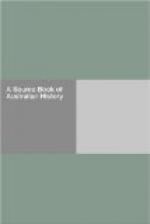Ten years after the great conference of 1891, the work of Sir Henry Parkes and his fellow federationists reached its culmination. The first truly Australian Parliament was opened by the Duke of Cornwall and York (King George V).
By the hand of royalty, in the presence of the greatest concourse of people that Australia has seen in one building, and with splendid pomp and ceremonial, the legislative machinery of the Commonwealth was yesterday set in motion. The day was full of smiles and tears, the smiles predominating. Rising gloomily, the dispersing clouds allowed the bright sun to peep through, and when the great ceremony was in progress in the Exhibition-building, the atmosphere was radiant, and illuminated the vast spaces of the building and the great sea of faces with a bright Australian glow.
A sight never to be forgotten was the assemblage which, in perfect order, but with exalted feeling, awaited the arrival of the Duke and Duchess in the great avenues which branch out from beneath the vast Dome of the Exhibition-building. We have not in Australia any sense of the historical prestige which attaches itself to a royal opening of the British Parliament. There the stately function is magnificent in its setting and pregnant in its associations, but it is in scarcely any sense of the word a people’s function.
Here, by a happy inspiration, the function was made, to the fullest extent, a popular one. Twelve thousand seated in a vast amphitheatre—free people, hopeful people, courageous people—entrusted with the working out of their own destiny, and rejoicing in their liberty, must be impressive by reason of their numbers alone.
But there was not wanting splendour of accessories. The mighty arches of the dome, the spread of the great transepts, the grace of the decorations, were in themselves inspiring; nor was even the sombre shade of the mourning dressing, softened by splashes of purple here and there, out of keeping with the event, typifying, as it did, our reverential regard for the memory of a great Constitutional Ruler, the mightiest Sovereign of the people the world has known.
Broadly speaking, what was represented in the noble assemblage was worth. The worthiest of Australia were there—the men who hold their distinguished positions because they have won them, and because they deserve them. All that is best in politics, in commerce, in industry, in the arts, in the Church, in the school, in the public service of Australia was represented there, and every heart beat high with pride and with hope.
Faint and far off, just about noon there came the sound of the National Anthem, and there was a multitudinous murmur and stir, for here was the actual event coming at last. Then near at hand came the blare of a trumpet heralding the approach of the Imperial envoys, and a moment or two after, with royal punctuality, the Duke and Duchess were on the dais, and the strains of the National Anthem came pealing through the building.




